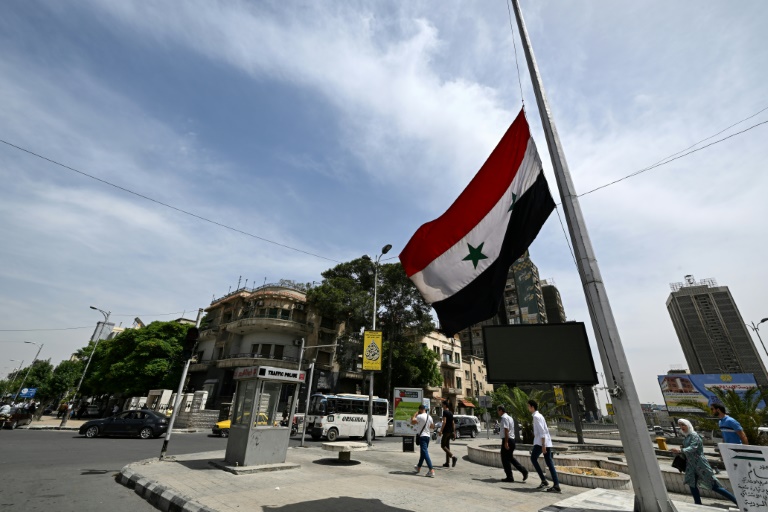Worry in Damascus, joy in rebel areas at Raisi’s death

The Syrian flag flies at half-mast in Damascus on May 20, 2024, after the country announced three days of national mourning following the death of Iran’s President Ebrahim Raisi and others in a helicopter crash
Damascus – Syrians in Damascus voiced concern Monday at the impact on their country of the death of Iranian president Ebrahim Raisi, as some in Syria’s last main opposition bastion were celebrating.
Tehran has been a key ally for Syrian President Bashar al-Assad, and housewife Hazar Mazhar said “everybody is talking about the news, but I don’t know if what happened will impact us, or what the coming days will bring.”
“I’m afraid of the impact on the economy… I hope this incident doesn’t affect our livelihoods,” the 49-year-old said.
People had been glued to screens since the news erupted that Raisi’s helicopter had gone missing on Sunday as he and his entourage were returning from a border meeting with Azerbaijan’s President Ilham Aliyev to inaugurate a dam.
News of the crash “was a shock”, said Nizar Jammul, 29, from a cafe in the Syrian capital.
“I’ve been following the news since yesterday afternoon … the main thing I did this morning was check until they officially announced the Iranian president’s death,” he said.
Raisi was confirmed dead on Monday after search and rescue teams found the wreckage in a fog-shrouded western mountain region of Iran.
The dramatic events have dominated conversations in Damascus, where flags flew at half-mast at official buildings and the government has declared three days of mourning.
Iran has helped the Syrian government claw back territory lost earlier in the 13-year-old conflict, which has killed more than half a million people and ravaged the country’s infrastructure and industry.
Assad “affirmed Syria’s solidarity with the Islamic Republic of Iran and with the families of the late deceased and his comrades”, the presidency said in a statement.
Assi Shalhub, 40, a software developer, noted the “old and close alliance” between Syria and Iran.
“Tehran is our main supporter, and anything bad that happens to it will impact us too,” said Shalhub, who lives near the Iranian embassy.
The facility’s consular annex was levelled last month in a deadly air strike widely blamed on Israel, killing seven Iranian Revolutionary Guards, two of them generals.
In Dana in northwest Idlib province — Syria’s last main bastion of armed opposition, where residents are furious at Iran’s long-standing support of Damascus — the scene could scarcely have been more different.
Raisi’s death “is a great joy for all the people of Idlib and the displaced in this region,” said Maher Bulad, 40, who was distributing sweets to passersby.
“The Iranians took part in the spilling of Syrian blood, killed children, and forced families” to flee, said Bulad, who left his native Aleppo, which was retaken by the government with Iranian support.
Damascus’s suppression of an uprising that erupted in 2011 triggered full-scale war, with the conflict drawing in foreign armies and international jihadists.
Khaled Hassan al-Sheikh, 62, a father of seven who lives in a tent, said: “Our joy is limitless today … after the death of the Iranian criminals.”
